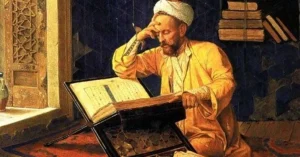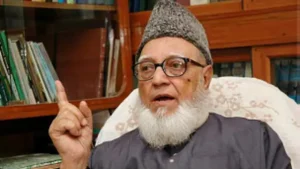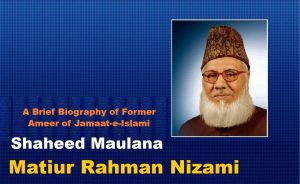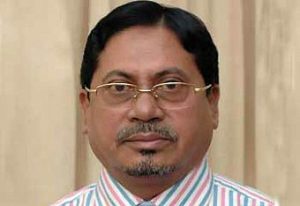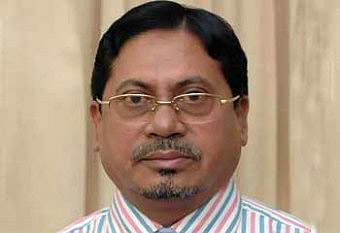
Mohammad Kamaruzzaman
Education and Academic Life
Shahid Kamaruzzaman began his educational journey at Bajitkhila Primary School in Sherpur, where his exceptional intellect and passion for learning became evident. From a young age, he demonstrated discipline and a natural curiosity that laid the foundation for his future achievements.
Secondary Education and Ideological Awakening
He continued his studies at Sandikona High School, consistently ranking among the top students. Known for his calm demeanor and articulate speech, Shahid Kamaruzzaman earned respect from both teachers and classmates. During this period, he developed a keen interest in Islamic literature and philosophy, which helped shape his ideological outlook.
Higher Education at Sherpur College
After completing his secondary education, Shahid Kamaruzzaman enrolled at Sherpur College, where he further honed his leadership skills and expanded his ideological vision. His studies extended beyond textbooks to include Islamic history, comparative politics, and social philosophy, preparing him for a role as an influential thinker and organizer.
University of Dhaka: Journalism and Leadership
Shahid Kamaruzzaman’s academic journey continued at the prestigious University of Dhaka, where he earned both a Bachelor’s and Master’s degree in Journalism from the Department of Mass Communication and Journalism. His campus life was marked by:
- Active participation in intellectual debates
- Thoughtful contributions to student discussions
- A principled stance on moral and political issues
He balanced his rigorous academic work with leadership responsibilities, serving as the Central President of Islami Chhatra Sangha in 1971.
Role Amidst Political Turmoil and Student Activism
During his university years, the political unrest in East Pakistan was intensifying. As a student leader, Shahid Kamaruzzaman actively organized student activities and strongly advocated for peaceful political and social reforms. During this turbulent time, he led with discipline, ideological clarity, and a steadfast commitment to non-violence.
Political Journey and Leadership
Shahid Kamaruzzaman began his formal political career in the late 1960s by joining Islami Chhatra Sangha (ICS), the student wing of Jamaat-e-Islami. His charismatic leadership and strategic vision led him to become the Central President of ICS in 1971, during a highly volatile period in the region’s history.
Commitment to Non-Violence and Islamic Reform
Post-Independence Challenges and Organizational Revival
After Bangladesh’s independence, Jamaat-e-Islami faced a ban due to its stance on the liberation war. During this time, Shahid Kamaruzzaman remained intellectually active and committed, and he quietly worked to revive the party when the government allowed it to resume activities in the late 1970s
Rise Through Jamaat-e-Islami’s Ranks
Through tireless dedication and strategic thinking, he rose steadily within the party hierarchy, eventually becoming a member of the central working committee. His loyalty and leadership earned him widespread respect among party members.
Assistant Secretary General: National Leadership Role
In 2000, party members elected Kamaruzzaman as the Assistant Secretary General of Bangladesh Jamaat-e-Islami, and he served in that role until his martyrdom. He played a pivotal role in policy planning, grassroots mobilization, and international outreach, particularly inspiring the youth with Islamic ideological messages.
As the executive editor of The Weekly Sonar Bangla, Kamaruzzaman used his platform to articulate Islamic perspectives on politics, economics, and society. His editorial work showcased his deep understanding of both national and international affairs.
Contributions to Islamic Journalism
As the executive editor of The Weekly Sonar Bangla, Kamaruzzaman used his platform to articulate Islamic perspectives on politics, economics, and society. His editorial work showcased his deep understanding of both national and international affairs.
Symbol of Integrity and Consistency
Throughout his political career, Kamaruzzaman was known for his honesty, simplicity, and ideological steadfastness. He never sought personal gain or compromised Islamic principles, responding to political repression with patience and dignity.
Trial and Imprisonment
An intense legal battle and a period of prolonged incarceration defined the final chapter of Shahid Muhammad Kamaruzzaman Khan’s life, ultimately leading to his martyrdom. To his followers and many human rights observers, the case against him was less a pursuit of justice and more a politically motivated act aimed at silencing a prominent voice of Islamic leadership in Bangladesh.
Background to the Trial
In 2010, the Government of Bangladesh established the International Crimes Tribunal (ICT) with the stated objective of trying individuals accused of war crimes during the 1971 Liberation War. While the initiative garnered public support, numerous international observers, including Human Rights Watch, Amnesty International, and legal experts from the UN, raised concerns about the lack of due process, political influence, and procedural shortcomings in the tribunal.
On July 13, 2010, law enforcement officers arrested Muhammad Kamaruzzaman from his residence in Dhaka and detained him for several months without filing formal charges. Later, the authorities accused him of committing crimes against humanity during the 1971 war, specifically for his role as a student leader of Islami Chhatra Sangha. The charges included complicity in killings, abductions, and torture—allegations which he and his legal team categorically denied.
The Trial: Legal Controversies and Criticism
Kamaruzzaman’s trial began in 2011 under the ICT-2 tribunal. Despite repeated appeals, his defense was denied adequate time and access to documents and witnesses. Many legal experts argued that the court violated key evidentiary standards and failed to prove the charges beyond reasonable doubt. Observers also claimed that authorities coerced witnesses or prevented them from testifying in Kamaruzzaman’s defense.
Many critics frequently cited concerns that the authorities conducted the entire trial process without transparency, rushed the proceedings, and appeared intent on securing a conviction. Despite international appeals and criticism, the tribunal sentenced him to death on May 9, 2013, on five counts of alleged war crimes.
Life in Prison and Spiritual Strength
During his imprisonment, Kamaruzzaman remained calm, composed, and spiritually resolute. Visitors often noted his serene demeanor, frequent prayers, and unwavering trust in divine justice. He spent his days in worship, Qur’an recitation, and reflection, offering inspiration to those who met him in jail.
Even under the shadow of a death sentence, he never expressed regret or fear, affirming his innocence and trusting that his suffering was part of a greater divine plan. In letters to his family and followers, he reminded them to stay steadfast, patient, and committed to the cause of truth.
Martyrdom
To his supporters, Kamaruzzaman was not a war criminal, but a political prisoner, unjustly punished for his ideological stance and leadership role in the Islamic movement. His trial and execution remain a controversial and deeply emotional chapter in Bangladesh’s political and legal history. Legal experts continue to cite his case as an example of how justice can be undermined when courts are used for political purposes.

